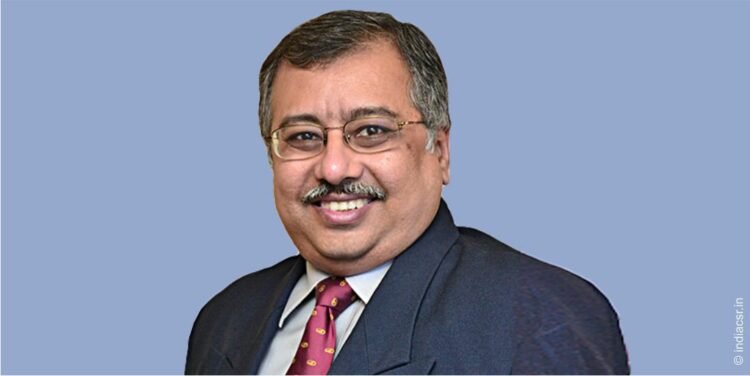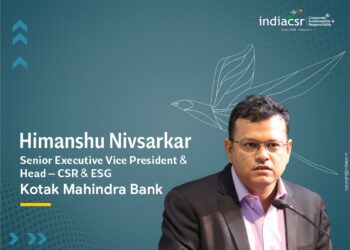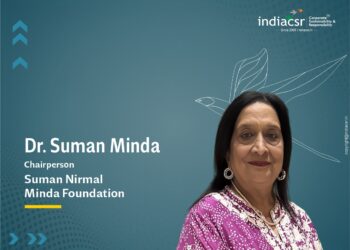Corporates today recognize that climate change is an issue that directly impacts their business and it is therefore imperative that sustainability led actions be embedded in their business strategies. In this interview we talk to Anirban Ghosh, Chief Sustainability Officer, Mahindra Group on the business case for Sustainability.
Do you have a Sustainability roadmap for the Mahindra Group?
Yes, every one of our businesses that falls under the scope of reporting has a sustainability roadmap, with targets taken to reduce carbon emissions, water consumption, increase in use of renewable energy and enhance recycling of waste being some of the items on the roadmaps. These roadmaps are reviewed periodically and updated. Roadmaps allow us to gauge progress and keep our processes in check to achieve the desired results. They pave the way for us to integrate our Sustainability commitments into our overall business as well as the supply chain across the Group to create value for our stakeholders.
What is the definition of Sustainability at Mahindra Group?
We define sustainable business as, “Building enduring businesses while rejuvenating the environment and enabling stakeholders to Rise”. This takes addresses all three aspects of the triple bottom line – People, Planet and Profit; The overall approach of sustainability work is to give back more than we can take.
How we apply sustainability in Mahindra?
Sustainability is a holistic concept. It goes beyond financial well-being and is not only about environmental responsibility. The holistic approach is captured in the definition of sustainable business that is enshrined in our Sustainability Framework. The work that we do in sustainability in the Mahindra Group is rooted in the elements of the framework. Each business in the Group identifies issues that are material to it, makes a roadmap with targets and works to achieve them. Progress is measured using a sustainability dashboard and achievements are recognized during the Mahindra Rise Awards program. In addition, integration of sustainability within the business is assessed through the group-wide total quality management process called, “The Mahindra Way” and externally assured by an authorized organization annually.
The governance of sustainability is through sustainability champions at each location and also in each business who are assisted by business level sustainability councils. There is also a Group-wide Sustainability Council and the CSR Committee of the Board has oversight of sustainability. Executive Councils of businesses review progress in each business.
An important part of embedding sustainability into our culture is the “Make Sustainability Personal” program through which individual colleagues across the business take on climate friendly tasks at home and at work. This creates a positive atmosphere within the Mahindra Group for doing the right things to build sustainable business.
Tell us about a recent challenge you faced while working on a sustainability project.
Sustainability is often considered as being “a cost”. It is a common challenge faced by sustainability professionals. Over the years we have been able to show that sustainability projects can benefit the planet and the business simultaneously. The war is not over and I am sure we will have to keep doing this many times over. Sometimes the challenge is about finding appropriate solutions for colleagues who want to do the right thing but don’t know how!
Describe a sustainability indicator which you created. How did it benefit your company?
Finance folks wish to have projects that are financially viable while sustainability folks look for environmental benefits such as emission reduction. We brought the two together in the form of an index – emission reduction / payback period – an index in which bigger is better and this helped us prioritise the implementation of projects.
What factors do you consider when proposing a sustainability initiative?
The initiative needs to have environmental benefits, must excite people and must be financially viable. If these conditions are in place, the sustainability initiative is worth considering.
How do you successfully monitor sustainability indicators?
Sustainability indicators are measured on an ongoing basis and recorded in a software solution used across the Group. Performance is tracked by sustainability champions and sustainability councils in businesses across the Group. Performance is disclosed in GRI certified, externally assured Sustainability Reports and in external disclosures like DJSI and CDP.
Share an example of a sustainability project goal or strategy Mahindra developed which helped the most.
There are a number of sustainability goals that we are pursuing just and many other organizations are doing the same. But there is one – “Ensure Zero Waste to Landfill” – that we can legitimately claim to be pioneering. As a part of this goal we are working to ensure that “waste” is reduced, re-used, repurposed and recycled in appropriate ways so that it does not end up in landfills and cause widespread environmental and social damage. Consequently, many locations across the Group are not certified as being zero waste to landfill, having diverted more than 99.9% of their waste from landfills. Apart from being extremely beneficial to the environment, the work has added more that Rs. 100 crores to the bottom line for the Group already.
Do you have a practice of publishing a Sustainability Report? Please elaborate.
Mahindra has been actively reporting on its sustainability performance since 2007. Regular data updates by all businesses are reviewed and an externally certified Sustainability report conforming to GRI standards is published by the Group. Many businesses in the Group publish their own Sustainability Report as well. The reports have won multiple awards for excellence.
As a leader in sustainability, how will you see sustainability for people and planet?
The planet is telling us that we human beings are living beyond its boundaries. The solution is not to be environment friendly by doing less but being environment friendly by doing differently. We have many solutions already available that can take us in this direction and there are many solutions that are developing that will ensure development within the boundaries of nature. Adopting the solutions widely and quickly will make the earth a safe place to live in.
What is your own definition of Sustainability?
The idea of every person in the world living comfortably, equitably and collectively doing so within the boundaries of nature is my personal definition of sustainability.























